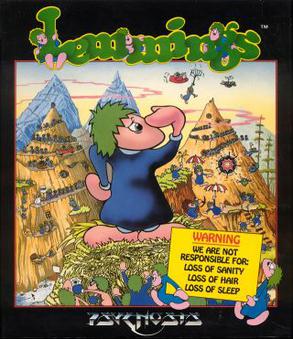
Lemmings is a puzzle–strategy video game originally developed by DMA Design and published by Psygnosis for the Amiga in 1991 and later ported for numerous other platforms. The game was programmed by Russell Kay, Mike Dailly and David Jones, and was inspired by a simple animation that Dailly created while experimenting with Deluxe Paint.

Rise of the Robots is a fighting game released by Time Warner Interactive in 1994. Originally developed for the Amiga and DOS by Mirage's Instinct Design, it was ported to various video game consoles, including the Super NES, the Mega Drive, and the 3DO Interactive Multiplayer. The game includes a single-player mode in which the player assumes the role of the ECO35-2 Cyborg as he attempts to stop the Supervisor who takes over Electrocorp's facilities in Metropolis 4, and a two-player mode in which the second player controls a character chosen from among EC035-2's enemies.

Shadow of the Beast is a platform game developed by Reflections and published by Psygnosis in 1989. The original version was released for the Amiga, and was later ported to many other systems. The game was known for its graphics, with many colours on screen and up to twelve levels of parallax scrolling backdrops, and for its atmospheric score composed by David Whittaker that used high-quality instrument samples.

Zool 2 is a side-scrolling platform video game originally developed by The Warp Factory and published by Gremlin Graphics for the Amiga in November 1993. It is the sequel to the original Zool, which was released earlier in 1992 on various platforms.

Pinball Fantasies is a 1992 pinball video game originally developed by Digital Illusions and published by 21st Century Entertainment in Europe for the Amiga home computers. It is the sequel to Pinball Dreams, which was released earlier in the same year on multiple platforms. In the game, players can choose between any of the four available playfields, both of which have their own thematic and main objectives in order to obtain the highest score possible.

Soccer Kid is a 1993 side-scrolling platform game developed and published by Krisalis Software in Europe for the Amiga. The player assumes the role of the titular main protagonist who travels across several countries around the world to repair the World Cup by retrieving pieces that were scattered by the alien pirate Scab, the main antagonist who failed to steal and add it to his trophy collection in a robbery attempt. Its gameplay mainly consists of platforming and exploration elements, with a main single-button or two-button configuration, depending on the controls setup.
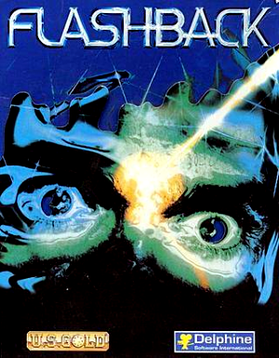
Flashback, released as Flashback: The Quest for Identity in the United States, is a 1992 science fiction cinematic platform game developed by Delphine Software of France and published by U.S. Gold in the United States and Europe, and Sunsoft in Japan.
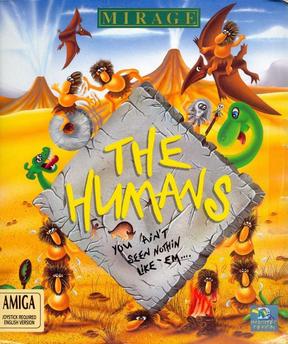
The Humans is a puzzle-platform video game developed by Imagitec Design in Dewsbury, England and originally published by Mirage Technologies for the Amiga in May 1992. It was later ported to other home computers and consoles. The goal of the game varies per level but usually revolves around bringing at least one of the player-controlled humans to the designated end area marked by a colored tile. Doing this requires players taking advantage of the tribe's ability to build a human ladder and use tools such as spears, torches, wheels, ropes and a witch doctor in later levels.
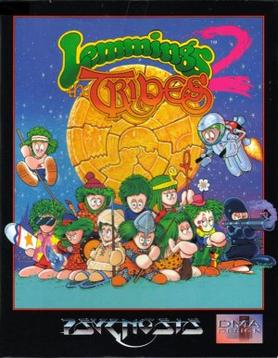
Lemmings 2: The Tribes is a 1993 puzzle strategy video game developed by DMA Design and published by Psygnosis, and is the sequel to the 1991 video game Lemmings. Similar to the original title, the game sees the player guiding various tribes of anthropomorphised lemmings through a number of levels, using various skills to help them reach the exit. Expanding on the mechanics of the original game, Lemmings 2 featured a more open-ended series of levels with different 'tribes', contained an overarching narrative, expanded the number of skills, simplified the requirements for clearing levels, and included a practice mode for players to test out new gameplay mechanics. Development of Lemmings 2 was more intensive, with Psygnosis having greater involvement in attempt to recreate the success of the original game. A focus on the production of the game was cross-development of a large number of ports, with the game released to consoles including the Mega Drive, Super NES and Game Boy. Lemmings 2 was a commercial success and received positive reviews from critics, with praise directed towards its additional gameplay mechanics and greater variety of levels and abilities.

Jungle Strike is a video game developed and published by Electronic Arts in 1993 for the Sega Genesis. The game was later released on several other consoles such as the Super Nintendo Entertainment System (SNES), and an upgraded version was made for DOS computers. The Amiga conversion was the responsibility of Ocean Software while the SNES and PC DOS versions were that of Gremlin Interactive, and the portable console versions were of Black Pearl Software. It is the direct sequel to Desert Strike and is the second installment in the Strike series. The game is a helicopter-based shoot 'em up, mixing action and strategy. The plot concerns two villains intent on destroying Washington, D.C. The player must use the helicopter and occasionally other vehicles to thwart their plans.
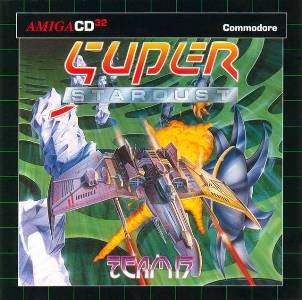
Super Stardust is multidirectional shooter developed by Bloodhouse and published by Team 17 for the Amiga (AGA) in 1994 and CD32 in 1995. The game was ranked the 26th best game of all time by Amiga Power.

Tim Wright, known professionally as Cold Storage, is a Welsh video game music composer most known for his work in video game soundtracks such as Shadow of the Beast II, Agony, Lemmings, Wipeout and Colony Wars.

Brutal: Paws of Fury is a 2D fighting game published by GameTek in 1994. The game features a cast of various anthropomorphic animals as selectable fighters. It also features the ability to learn new attacks and save them via passwords. Originally a Sega CD exclusive, it was later ported to other game consoles.

Worms is a 2D artillery tactical video game developed by Team17 and released in 1995. It is the first game in the Worms series of video games. It is a turn based game where a player controls a team of worms against other teams of worms that are controlled by a computer or human opponent. The aim is to use various weapons to kill the worms on the other teams and have the last surviving worm(s).

Shadow of the Beast II is a platform game developed by Reflections and published by Psygnosis in 1990. It is the sequel to the earlier Shadow of the Beast.

Lionheart is a platform game for the Amiga developed and self-published by German video game developer Thalion Software in 1993. Using a fantasy motif, the game takes place in the land of the Cat People, a race of feline humanoids, who are threatened by the evil Norka. The player assumes control of Valdyn, an outlaw swordsman who is also known as "Lionheart". Players have to fight their way through 14 levels filled with monsters and environmental hazards. Most of the gameplay is melee combat and precision platforming.
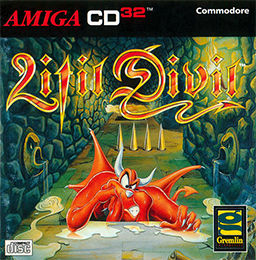
Litil Divil is a video game released by Gremlin Graphics Software in 1993. The game stars Mutt, a dog-like devil in the Underworld whose goal is to obtain the "Mystical Pizza of Plenty" from the Labyrinth of Chaos. Litil Divil's release was delayed several times, and the game was initially advertised in magazines under the name Little Divil.
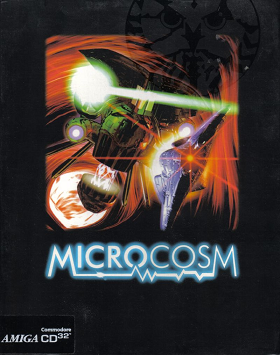
Microcosm is a 3D rail shooter video game developed and published by Psygnosis in 1993. It was originally developed for the FM Towns, and ported for the Sega CD, Amiga CD32, 3DO, and MS-DOS. Microcosm featured realistic FMV animation, with the graphics being rendered on Silicon Graphics workstations. The game is either in first-person or third-person view depending on the gaming system.

Brutal Sports Football is a 1993 sports video game developed by Teque London and originally published by Millennium Interactive for the Amiga. It was re-published for MS-DOS and Amiga CD32, and later became the first third-party title published for the Atari Jaguar. The first entry in the Brutal Sports series, the game is a fictional style of football played against human or computer-controlled opponents. It features a different take on american football by emphasising the violent aspect of the sport.

Marvin's Marvellous Adventure is a 1994 platform video game developed by Infernal Byte Systems and published by 21st Century Entertainment for the Amiga. An Amiga CD32 version was later released in 1995. It stars Marvin, a pizza delivery boy transported into another dimension embarking on an adventure to defeat an evil being known as Dark-One and rescue a professor who ordered a pizza. The player must traverse through 60 levels and search for items and power-ups, while defeating enemies along the way.




















